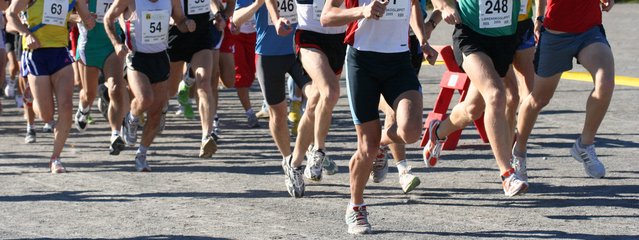
The Great Restart: Why we struggle to get back on track
Before the pandemic hit, I was running just about every day. I was logging about 25 miles per week from February to December.
I was either doing a training run or running a race, many times on Saturday and Sunday, and occasionally two races in one day.
Several times each year, I would choose “destination races“ — if there was an interesting race theme (like running in flip-flops for The Guinness World Record to qualify for the most people running in flip-flops for a race, or running dressed as a Dole Whip for a Disney race) I was there!
Then everything stopped. You can probably hear the screeching break sound effect in your head.
All races were canceled or converted to virtual. I did a few, but they weren’t the same. Over a few months, it didn’t seem so urgent to hit my training miles because I was not training for anything.
I’d run a few miles here and there. I still worked out doing other things, but running got pushed to the bottom of my list. And it was something I loved to do.
By June, I pretty much stopped running. By July, my running shoes were in the back of my closet.
In September, I vowed to start up again. I didn’t.
October came and went without a mile, and so did November - simply did not lace up and run.
I missed running, missed the euphoria after a run, known as the “runner’s high.“ But I still did nothing.
Then last Saturday, I willed myself to get on the treadmill. I was nervous, wasn’t sure I could do it. And I question my ability.
I told myself I’d give it seven minutes. Then I hit my stride and I did a 30 minute run. I repeated this on Sunday, and every day this week.
It is now Friday afternoon, my run is complete and I can’t wait to run again tomorrow.
Why do I share the story? So many of us get out of our routines (especially this year) and then struggle to reclaim our groove.
Why is restarting so much harder than starting in the first place?
There isn’t a whole lot of empirical data available on restarting, but it seems to have something to do with the brain’s tendency to default to routines.
When you have a new routine, it’s exciting and can cause a dopamine rush; you keep doing it until it’s part of your automatic routine, even as the excitement dissipates.
When you stop your routine, and think about restarting, maybe that excitement just isn’t there, or maybe it’s not enough to drive your behavior.
That’s where your executive functions can help override your reluctance, but even then it can be a challenge. Some people, Once they stop, show reluctance because they feel “they are starting over,” and that can feel like a defeat. It’s not.
So as I finish up this writing, I am in my running gear. It’s a rainy day, early 2020, and I am about to jump on the treadmill.
Will I be as fast as I was last year at this time? Probably not. But I’m going to give myself permission to start over every time I lace up.
Here’s to being an experienced beginner!
Photo by Einar Hansen from FreeImagesThe Brain Coach Blog is written by executive function coach Mary Turos. Based in Belair, MD, Mary is affectionately known as 'The Brain Coach" for her work helping people achieve harmony using strategies based in neuroscience.